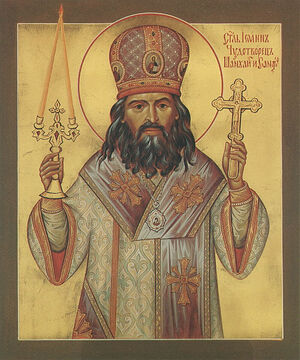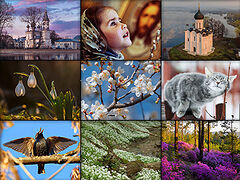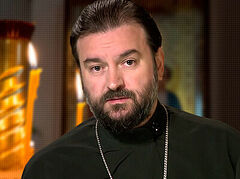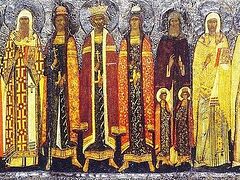 The day of remembrance of the saints who shone in the Russian land points us to the spiritual sky under which the Russian land was created and lived. Before Holy Prince Vladimir, disparate pagan tribes lived on Russian soil, feuding with each other. Holy Prince Vladimir brought them a new faith, a new consciousness, the meaning of life, a new inner state of mind, gave them a new, unifying spirit of life, and so a single people was formed.
The day of remembrance of the saints who shone in the Russian land points us to the spiritual sky under which the Russian land was created and lived. Before Holy Prince Vladimir, disparate pagan tribes lived on Russian soil, feuding with each other. Holy Prince Vladimir brought them a new faith, a new consciousness, the meaning of life, a new inner state of mind, gave them a new, unifying spirit of life, and so a single people was formed.
The very existence of the Russian people is associated with the birth of spiritual life in them, with the assimilation of the foundations of the Christian worldview. It is pointless to look for the meaning and purpose of life in earthly life, which ends in death. We must strive to assimilate the divine, grace-filled, eternal life, and then this temporal, earthly life will be arranged: Seek first the Kingdom of God and His righteousness, and all these things will be added to you (Matt. 6:33).
The faith, the Orthodox Church united the disparate tribes into one people, and the most essential property of the Russian people was faith in the Kingdom of God, the search for it, the search for truth. For the sake of the Kingdom of God, for the sake of communion with Him, for the sake of prayer, Russian ascetics departed from the worldly bustle to the forests, to uninhabited islands. They sought only the Kingdom of God; they did not want to create or build anything, they left people, but people followed them for the sake of the Kingdom of God, which they found on those islands and forests around the righteous ones. And thus lavras and monasteries grew.
The search for truth is the main thread of life of the Russian people, and it is no coincidence that the first written code of laws, which was supposed to regulate life, was called “Russian Truth”. But not only those who left the world and people thought about heaven, about the Kingdom of God. All Russian believers understood the meaning of life. All those who truly built Russia as a state, living in the world and fulfilling their duties, also considered that the most important thing was to be faithful to the Divine Kingdom and Divine Truth.
In Russia there were princes, generals, masters, people of all kinds and occupations, but their basic understanding, and aspiration, and the meaning of life was also the acquisition of the Kingdom of God, and participation in it. St. Alexander Nevsky spent his whole life in military and state exploits. He rode a horse across Siberia to the Tatar Khan to arrange peace in Russia, and became famous for military victories; but when he fell ill and death drew near, he accepted it as liberation from the labors of earthly life and gave himself up to what was dearest to his soul—he recieved the monastic tonsure in order to enter the longed-for Kingdom of God. He was no longer a warrior of earthly life, but of Christ.
Prince Theodore of Smolensk also became a monk before his death. Such spiritual leaders of the Russian people in their striving for the Kingdom of God are the best examples of the main feature of the spiritual life of the people, the main force that guided their historical life. The assimilation of the Christian faith also regenerated the Russian princes.
Power is always an expression of consciousness and will. Authorities are always guided by one or another philosophy, one or another understanding of the purpose and meaning of life and work. Before St. Vladimir, Russian princes were leaders of militant tribes and waged wars for the sake of spoils of war and glory. As Christians, they became the heads of separate parts of a single people. With the adoption of Christianity, consciousness and a sense of unity appeared. Truth/righteousness was in the brotherhood of the princes, and internecine war became untrue, unrighteous.
Holy Prince Vladimir gave the Russian people a new meaning of life and a new vitality. Disasters, failures, and defeats are powerless before the main force of life, powerless before spiritual life. The Kingdom of God and the spiritual joy of participating in it remain unaffected. A terrible storm passes, and a man lives again. Thus, the martyrs smiled with a joyful sense of the grace of God during the cruelest torments. Hence the life force of Russia. Disasters do not strike her heart. The Tatars burned down the whole of Russia. Kiev fell, and in the same year Novgorod rose, and the great commander and leader of the Russian people, the blessed Prince Alexander Nevsky, rose up the Russian people to fight not with the Tatars, who tortured the body of Russia, but with the Catholic Swedes, who, taking advantage of Russia's misfortune, wanted to capture the soul of the Russian people and quash the spiritual power of the Russian people and of Russia. For Alexander Nevsky, it was necessary above all to preserve that spiritual strength.
The history of the rise of Moscow is a vivid confirmation of the same idea. At its inception, Moscow was a small, local community. But at its head were the pious princes who had taken on this Orthodox understanding of the truth. Therefore, when Holy Metropolitan Peter told the prince that Moscow would be exalted and the saint himself would live and be buried there, if the prince would build in Moscow a House of the Most Holy Theotokos; and the prince fulfilled this covenant. In other words, St. Peter said that if you are faithful to Orthodoxy to the end, and seek above all the Kingdom of God and His righteousness, then all this, everything worldly, earthly, and political, will be added to you. Such was the vision of Moscow, and it was faithful to the testament of St. Peter; and the military roll call for the night watch at the Kremlin walls was composed with words: “Holy Mother of God, save us.” That does not mean that both life and people were holy! Oh no! People are always sinful. But it is important, it is salvific when there is a consciousness of good and evil, when there is a desire for truth; because then one can rise from the depths of a fall. Sinful Moscow, the capital of sinful Russia, fell to the bottom in its historical life, but it rose again, and because its awareness of truth, it did not die.
During the Time of Troubles, Russia fell so far that all her enemies were sure that she was mortally defeated. Russia had no tsar, no government, and no army. Foreigners were in power in Moscow. People were “cowardly,” weakened, and waited for salvation from foreigners, before whom they fawned. Death was inevitable, and Russia would inevitably have perished if the awareness of Truth had been completely lost. But Russia, the Russian people, were saved by St. Hermogenes. The enemies of Russia kept him in the basement of the Kremlin, mocked him, tortured him, and tried to make him submit to them, to change the Russian understanding of the Truth. St. Hermogenes was tortured to death, but he did not give up spiritually and called Russia to its historical path of a Christian state with a Christian government; he called Russia to remember the Truth and to be faithful to it.
St. Hermogenes, in faith and confession, spiritually and morally revived the Russian people, and they once again began to seek the Kingdom of God and its truth, the truth of subordinating earthly state life to the spiritual principle. And Russia rose up.
It is impossible to find in history such a depth of a state’s fall, and such a speedy, miraculous arising a year later, when people spiritually and morally rebelled. Such is the history of Russia; such is its path. After Peter I, public life [in Russia] deviated from the Russian way. Although she did not completely deviate, she lost the clarity of consciousness of the truth, the clarity of faith in the Gospel truth: Seek first the kingdom of God and His righteousness.
The grave sufferings of the Russian people are a consequence of Russia's betrayal of itself, its path, its vocation. But those onerous sufferings, the longing for life under the rule of fierce atheists, say that the Russian people have not completely lost consciousness of the truth, that the untruth of the godless state and godless power is spiritually and morally hard for them. Russia will rise in the same way as it has risen before [This sermon was delivered while Russia was still under the atheist communion yoke. And Russia did indeed arise.—OC.] It will rise when faith is kindled. When people spiritually rise, when clear, firm faith in the truth of the Savior’s words will be dear to them again: Seek first the kingdom of God and his righteousness, and all these things will be added to you (Matt. 6:33). Russia will rise when it comes to love the faith and confession of Orthodoxy, when it sees and loves the Orthodox righteous and confessors.
Today, on the day of All Saints who have shone forth in the Russian land, the Church directs our attention to them, and the Orthodox see with spiritual delight how many there of them are in the Kingdom of God! And how many are still not glorified—they are innumerable. Here, Metropolitan Vladimir of Kiev is silently and serenely going to his death. The murderers take him out of the gates of the Lavra to kill him outside the city, as they killed the Lord and Savior, and the saint silently, like a lamb to the slaughter, accepts death for Christ, for the faith, for the Russian Church, for what he sought above all things to gain the kingdom of God, eternal life.
There are many martyrs and confessors, and again we see God's blessing on their labor of faith, and again incorruptible relics appear: the bodies of the righteous, who already live according to the laws of the future life, where there is no suffering or corruption; and the incorruptibility of their relics testifies to that. Thus, the imperishable remains of the Grand Duchess Elizabeth Feodorovna, reposing in the Gethsemane monastery, testify to us about her righteousness in the eyes of God.
Russia will rise up when it raises its eyes and sees that all the saints who have shone in the Russian land are alive in God’s Kingdom, that the spirit of eternal life is in them and that we need to be with them and spiritually touch and partake of their eternal life. This is the salvation of Russia and the whole world.
In [communist] Russia there was no spirit of life, there was no joy of life. Everyone was afraid of her, as they are afraid of demons. Russia used to be just as frightening to other powers, but this was because it attracted nations to itself.
Fidelity to the commandment Seek first the kingdom of God and His righteousness created Russian humility and humbled authorities, and in the days of the greatest earthly glory, the Russian government, through the mouth of Emperor Alexander I, confessed itself as a Christian power and wrote on the monument to his glory: Not to us, Lord, not to us, but to Your name (Ps 113:9).
The Russian heaven, the Russian saints call us to be with them, as they are with us. They call us to join the spirit of eternal life, and the whole world longs for that spirit. The whole world needs a restored Russia, from which the spirit of life departed, and it is all trembling in fear, as before an earthquake.
Russia is waiting for a Christ-loving army, Christ-loving tsars and leaders who will lead the Russian people not for the glory of the earth, but for the sake of loyalty to the Russian path of truth. Not to us, O Lord, not to us, but to Your name. In repentance, in faith, in purification, may the Russian land be renewed and may Holy Rus’ arise.
***
From the book "Vladyka John – the Saint of the Russian Diaspora", published by the Sretensky Monastery publishing house.




